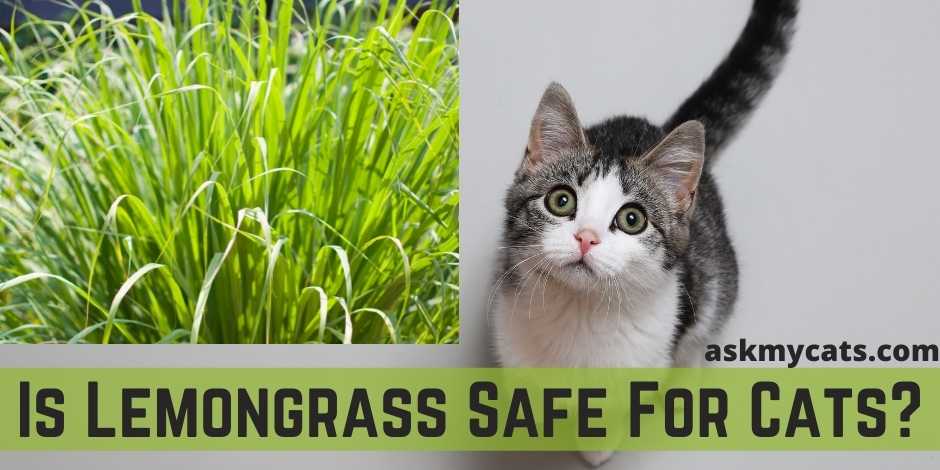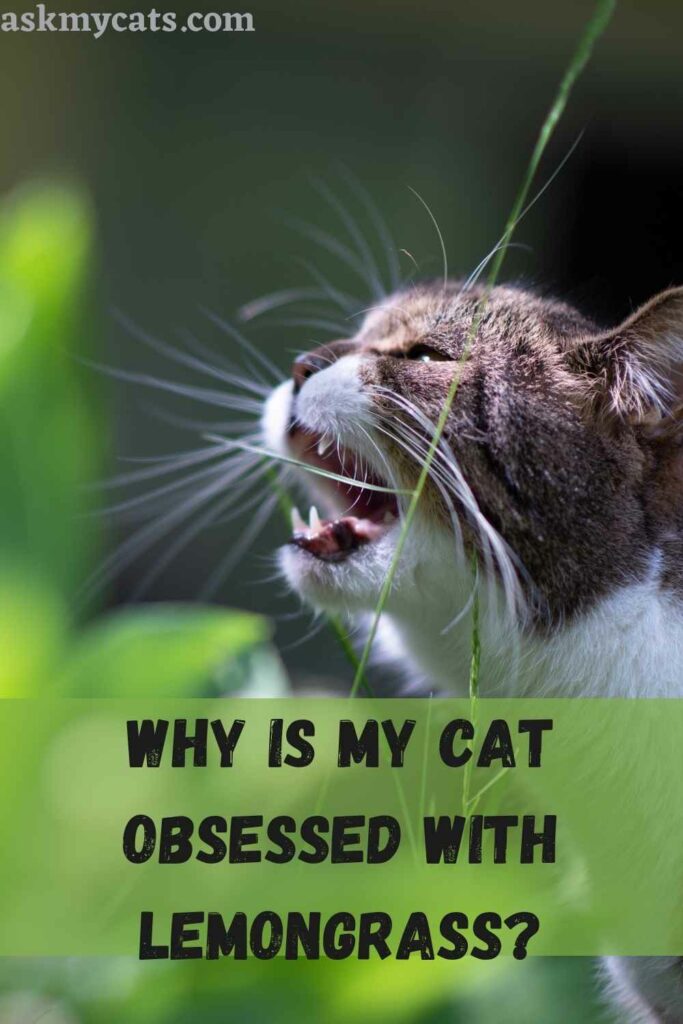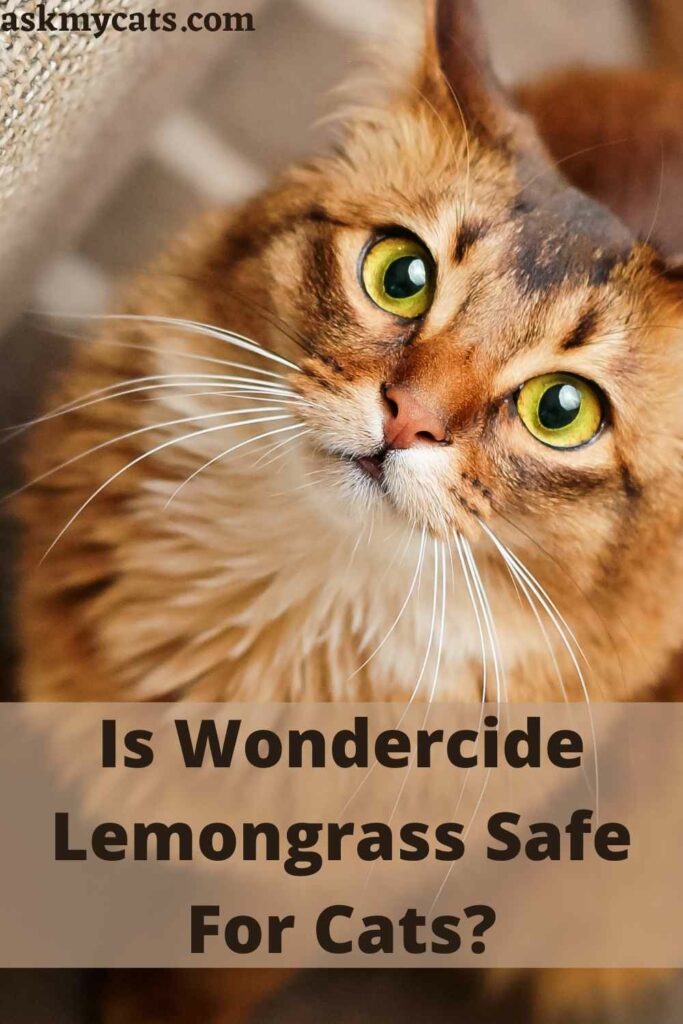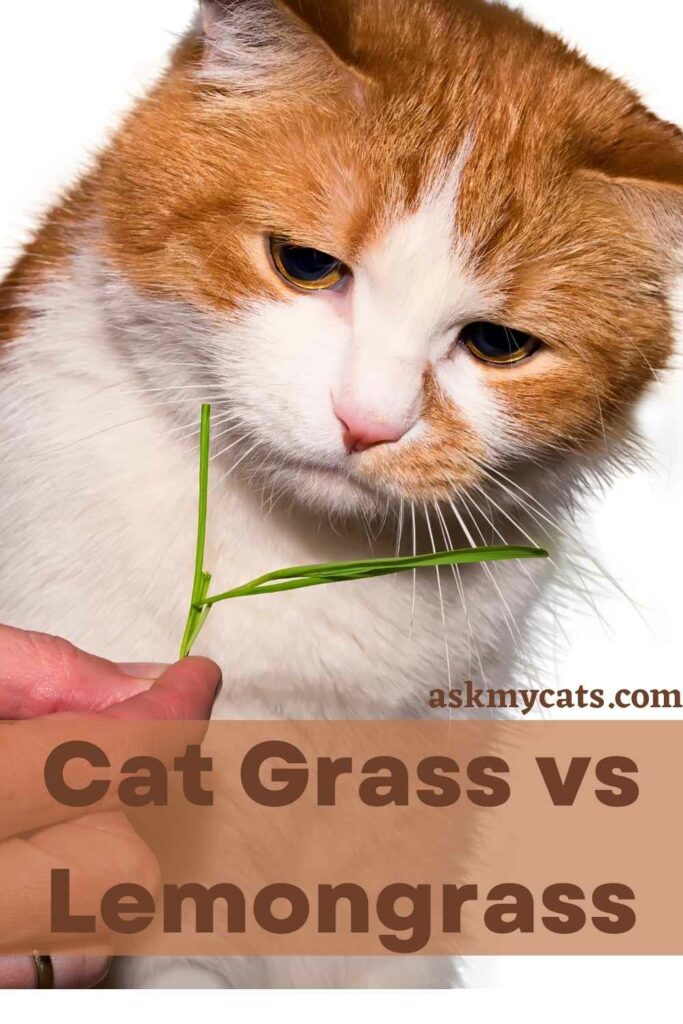Lemongrass is a versatile component that may be found in a variety of dishes. Marinades, stir-fries, spice rubs, salads, and kinds of pasta can all benefit from it. Cats usually control how much food they consume or nibble, but some cats may not be able to control how much grass they eat, especially lemongrass.
So, is lemongrass safe for cats?
Yes, lemongrass is fairly safe for cats if given in moderation. However, it can also be mildly toxic if eaten too much and may lead to a mild GI upset. It is nearly impossible for any cat to consume enough lemongrass to become seriously ill. The majority of cases are extremely mild and resolve on their own.
This article will talk about is lemongrass safe for cats and why are cats attracted to lemongrass.


Give Your Cat the Perfect Day
Get the Free Ebook!
What Happens If Cats Eat Lemongrass?
If a cat eats lemongrass, it usually has a catnip-like effect on the cat.
Most cats respond to lemongrass in the same way that they do to catnip. A nibble-friendly patch of lemongrass, whether potted indoors or planted in an outdoor garden, is a safe cat treat. Lemongrass essential oil, on the other hand, is toxic to cats, so keep it in a safe and secure place.
Lemongrass, in its natural state—that is, as a plant—poses little to no risk to cats. It is possible that a cat will eat too much of it and vomit, but poisoning is unlikely.
“A nibble of lemongrass will not harm your cats,” says Dr. Fox, a columnist for the Washington Post’s Animal Doctor. “However, an intense craving may be an indication (rather than the cause) of an underlying nutritional deficiency or disease, such as hyperthyroidism.”
If your cat appears to be upset when you remove his lemongrass, make an appointment with a veterinarian and go over the animal’s diet.
How Do I Keep Lemongrass Off My Cat?
You can keep lemongrass of your cat by: –
While your cat is limited to the confines of your home, make certain that no other opportunities to consume lemongrass exist. Get rid of all lemongrass in your home.
Instead, grow cat-friendly grasses both inside and outside. Allow your cat to chew on these grasses instead of lemongrass with caution.
If your cat did not previously have an overwhelming desire to eat lemongrass or other dangerous substances, but it now does, take it to the vet for a thorough examination.
Your cat should be thoroughly examined and tested for everything from vitamin deficiencies to circulatory problems and even brain lesions.
After receiving the appropriate treatment for one of these conditions, one should be able to resume eating a more normal diet.
Keep an eye on your cat’s behavior and keep an eye on the environment it is in. If you notice it leaning toward lemongrass again, give it a small amount to chew on before moving it to a different area.
Are Cats Attracted To Lemongrass?
Yes, most cats are attracted to lemongrass.
Lemongrass is surprisingly appealing to cats, though in large quantities it can cause stomach upset. Set out a purchased specimen of this tropical plant in early summer and let it grow in the warmest, sunniest spot in your home until fall.
Lemongrass plants are killed by frozen soil, so they should be kept in a warm greenhouse during the winter. Some gardeners have success digging the clump in the fall and storing it indoors for the winter, but this is often a risky proposition.
Cats enjoy lemongrass and may nibble on it, according to experts. It may have a similar effect to catnip. Because the amount of essential oil and cyanogenic glycosides is low, a little nibbling should not be a cause for concern.
If your cat nibbles on this plant excessively, you should investigate why. It could be a result of pica, a healthy, or a nutritional problem, such as anemia or hyperthyroidism.
Why Is My Cat Obsessed With Lemongrass?
Your cat may be obsessed with lemongrass as it could be suffering from an underlying disease such as hyperthyroidism.

Lemongrass contains a variety of beneficial ingredients, including antibacterial, antifungal, anti-parasitic (nematode), antiseptic, diuretic, cooling, sedating, and digestive aids.
Lemongrass may also aid in the prevention of blood clotting and cancer.
Externally (as a strong tea), it will repel insects and clear up the athlete’s foot.
Cats may be harmed by concentrated lemongrass essence (essential oil) because, unlike humans and dogs, they lack certain liver enzymes that break down various compounds that, if not eliminated from the body, can be toxic.
As a result, hydrosols, rather than essential oil extracts of beneficial herbs, are used to treat a variety of feline health issues.
So, while a smidgeon of lemongrass will not harm your cats, an intense craving may indicate (rather than cause) an underlying nutritional deficiency or disease, such as hyperthyroidism.
Cats’ obsession with lemongrass can be a sign of anemia. In many cases, anemia is caused by an autoimmune disease, which can be triggered by vaccinations.
It could also be hereditary. Anemia in cats can be caused by adverse drug reactions, blood parasites (such as haemobartonellosis), viral infections (such as feline leukemia), bone marrow diseases, and hypothyroidism, among other things.
I would follow the veterinarians’ treatment plan because they were able to identify the type of anemia afflicting your cat.
Discuss with them the possibility of using blood transfusions, Procrit, cyclosporine, human gamma globulin, and folate as adjunctive treatments.
Is Wondercide Lemongrass Safe For Cats?
Yes, wondercide lemongrass is safe for cats.

Wondercide Lemongrass Home, Cat Flea & Tick Spray protects your cat from fleas, ticks, and mosquitoes without the use of harsh chemicals.
While traditional pesticides are injected into your pet’s bloodstream, Wondercide takes a different approach.
This spray contains some of the highest-quality, purest natural essential oils, which pests despise, causing them to flee and leave your best friend alone.
This spray can help to eliminate the pest life cycle by targeting the pests externally, keeping your kitty happy and healthy.
It has a pleasant lemongrass scent and can be used on your cat several times per week.
Benefits of wondercide lemongrass are: –
- It has a natural uplifting and revitalizing lemongrass aroma and is meant to kill and repel fleas, ticks, and mosquitoes without the use of harsh chemicals.
- Natural, holistic, vet-approved, and equally as effective as certain collars, pills, chewable, and drops, but without the harsh chemicals.
- Safe to use around the whole family and on dogs and cats of all ages, including pups, kittens, and elders, yet powerful enough to kill pests on fur and skin. You can use it as frequently as you like.
- This 3-in-1 plant-based product kills fleas on the carpet, furniture, bedding, flooring, cat condos, and dog kennels and has a naturally relaxing cedarwood smell.
- Made in the USA, this cruelty-free, biodegradable flea repellent is powered by nature.
Cat Grass vs Lemongrass
Cat grass and lemongrass both have their benefits as per the situation, so none is superior to the other. We have addressed the benefits of cat grass in our previous articles. The benefits of lemongrass are: –

1. It Has Several Nutrients
Lemongrass is high in potassium, copper, salt, calcium, magnesium, manganese, selenium, phosphorus, iron, zinc, folate, vitamin C, and antioxidants, making it beneficial to both humans and cats.
Tannins, saponins, alkaloids, flavonoids, macronutrients, and micronutrients are all included in Lemongrass powder.
Lemongrass, in short, is a nutrient-dense powerhouse. If given the opportunity, both cats and dogs will seek out a lemongrass plant for relief from any of the following conditions.
2. Treats Several Diseases
Lemongrass Uses & Benefits: –
- Treats anxiety
- Treats gastrointestinal problems
- Help with regulating sleep
- Lowers blood pressure
- Is anti-inflammatory
- Is anti-cancer
- Is a great antioxidant
- Is a great anti-fungal and anti-bacterial treatment. It’s better than antibiotics for treating pathogenic bacteria as it can treat 20 kinds of bacteria including E. coli, Salmonella, 7 different yeasts including Candida albicans, and 15 different types of fungi.
- Helps alleviate the pain around gum disease
- Helps delay the onset of seizures
- Is effective in its use against heartworms
- Helps with allergies and with reactions such as asthma
- Supports oral health. Helps with both plaque control and the prevention of gingivitis. Chewing on lemongrass stalks helps keep any oral bacteria at bay and keeps the mouth feeling fresh. Perhaps this is one of the main reasons pets naturally seek out the plant.
- Acts as a great insect repellent and helps against malaria
- Lemongrass is also an antipyretic, so it can be used to prevent fever when it gets too high
3. Detox
Lemongrass is a diuretic that aids in detoxifying. It’s high in antioxidants and helps to minimize oxidative stress by releasing a detoxifying enzyme that cleanses the liver.
It can aid in the removal of toxins from the digestive and cardiovascular systems. It aids in the removal of uric acids, impurities, and harmful cholesterol. It also assists the digestive system and increases blood circulation.
4. Helps In Digestion
Lemongrass is beneficial to cats’ digestive health and soothes stomach problems.
Lemongrass extract protects against stomach lesions, promotes good stools, is anti-diarrheal, decreases inflammation, aids in the elimination of parasites such as amoeba, relaxes the belly, minimizes belching or acid response, and serves as an antispasmodic.
5. Reduces Pain
When your cat is allowed to eat Lemongrass, it helps to relieve inflammation, pains, and aches. It improves stomach and joint pains, decreases tension, and relieves headaches and toothaches.
Lemongrass has been shown in studies to help block pain and prevent the patient from feeling discomfort.
6. Lemongrass For Cancer
Lemongrass has been demonstrated to be as effective as chemotherapy in both vitro and vivo animal trials but without hazardous side effects. Lemongrass includes an apoptosis-inducing chemical that encourages cancer cells to commit suicide without harming healthy cells.
It protects against DNA damage, is anti-mutagenic, and helps neutralize damaging free radicals, making it an excellent supplementary therapy to chemo-radiation.
Frequently Asked Questions
Is lemongrass Scent Bad for cats?
No, lemongrass scent is not bad for cats if it is in plant form. However, if we are talking about lemongrass essential oil it becomes deadly. All cats lack glucuronyl transferase, a liver enzyme, that helps to break down most essential oils, including lemongrass.
What is lemongrass poisoning?
Cats usually control how much food they consume or nibble, but some cats may not be able to control how much grass they eat, especially lemongrass. A slight GI upset is possible as a result of this. If your cat eats a lot of this grass, he or she is a danger of getting an intestinal blockage. You may need to restrict access to this grass due to how appealing it is to cats. Cymbopogon citratus, the type utilized in Thai and Asian cooking, is one of three types of lemongrass. Cymbopogon winterianus is a close relative of Ceylon citronella, a popular insect repellent. Citronella grass, or Cymbopogon nardus, resembles lemongrass except for its maroon stalks. Citronella oil is produced by this plant, which is somewhat poisonous to cats.
How to diagnose lemongrass poisoning in cats?
Lemongrass poisoning is diagnosed by following the trail of your cat’s symptoms. Your vet will order blood work, a biochemistry profile, a complete blood count, and urinalysis in addition to a comprehensive physical. The vet will use these tests to discover whether there are any poisons in your cat’s blood. Your cat may consume too much lemongrass since it is so appealing to it, putting it in danger of having an intestinal obstruction. He’ll order X-rays and ultrasound once you tell him what your cat has been consuming. Once your veterinarian has determined what is wrong with your cat, he will conduct additional tests to rule out pesticide toxicity.
Final Words
Even though lemongrass is only mildly harmful, you should avoid feeding it to your cat. Most cats will not ingest enough of a live plant to cause any problems. You should, however, keep an eye on them just in case. Overeating particular foods, such as lemongrass, can be caused by underlying problems in cats. Pica can also produce odd desires, leading to poisoning. If you’re concerned that this is the case, take your cat to the vet for a more thorough examination.
If you have any questions, ask us in the comments section.
